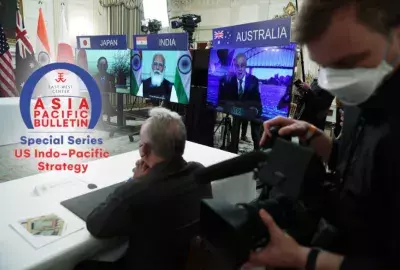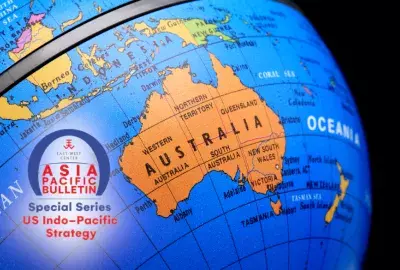Error message

|
Rebecca Strating, Asia Studies Visiting Fellow, explains that “China has significant economic levers it could deploy against Australia, particularly in commodity trade, tourism, and the higher education sector.” |
Over the past five years, Australia has expressed concern over China’s island building, militarization of land features, and excessive maritime claims in the South China Sea (SCS). Australia shares similar interests with the United States in upholding the maritime rules-based order, yet there are important divergences that reflect differing perspectives on geostrategic competition in the Indo-Pacific. While bipartisan support for the U.S. alliance remains strong, the importance of protecting trade relations with China has also shaped Canberra’s response to the SCS disputes.
Australian Interests
Like the United States, Australia is a non-claimant state in the SCS that opposes excessive claims inconsistent with the United Nations Convention on the Law of Sea (UNCLOS), and does not take a stance on overlapping territorial claims. Nevertheless, Australia has a number of key interests in the SCS.
First, the 2016 Defence White Paper noted that rising powers and non-state actors are challenging rules in the seas in ways that threaten regional stability and are potentially inimical to Australia’s security and prosperity.
Second, Australia expresses an interest in preserving Freedom of Navigation (FON). In terms of commercial transit, it is estimated that nearly two thirds of Australian exports pass through the SCS, although this figure has been contested. Much of Australia’s trade that travels through the SCS is coming to and from China, and it would not be in Beijing’s interests to interrupt this trade.
China has significant economic levers it could deploy against Australia, particularly in commodity trade, tourism, and the higher education sector. In the short-term, the prospect of Beijing using these levers to punish Australia is a greater risk to trade than China blocking sea lines of communication. However, given Australia’s geography, it has a long-term interest in ensuring that FON is maintained, particularly through key chokepoints such as the straits of Lombok, Sunda, and Malacca.
Third, Australian declaratory policy emphasises the need to maintain the global ‘rules-based order’. While this phrase serves as a proxy for ongoing U.S. primacy in the region, at the same time, the erosion of maritime law in the SCS threatens the legitimacy of the UNCLOS regime. Upholding UNCLOS is important as it provides Australia generous entitlements: it claims an Exclusive Economic Zone (EEZ) of over 10 million square kilometres, the world’s third largest.
Australia anticipates illegal fishing threats to grow in sophistication and scale over the next 20 years in its EEZ, particularly in the relatively abundant Southern Ocean. Australia also has an interest in the maritime rules protecting its Antarctic claims. Australia’s EEZ off the Australian Antarctic Territory (around 42 percent of Antarctica) could be interpreted as excessive, given that the 1959 Antarctic Treaty System froze sovereignty claims. In any case, Australia does not want to see its marine entitlements in Antarctica threatened by rising powers that challenge the legitimacy of UNCLOS. As a middle power with vast oceanic resources, the preservation of maritime rules is not merely about salvaging the US-led regional status quo, but is also linked to the core strategic defense interests of securing Australian territory, borders, and sovereign rights.
Defending the Maritime Rules-Based Order
Australia has engaged in a number of strategies to defend the maritime rules-based order in the SCS. In its public diplomacy, Australian leaders responded to the 2016 arbitral tribunal ruling that invalidated China’s nine-dash line and claims to historic rights in the SCS by imploring China to abide by the ruling and the ‘rules-based order’.
Australia’s own controversial actions in the Timor Sea dispute with Timor-Leste were also subject to Beijing’s claims that Canberra was hypocritical. In supporting the ‘rules-based order’, Australia ultimately relented on a number of legal points to resolve its maritime boundary standoff with Timor-Leste.
In its bilateral and multilateral diplomacy, Australia has emphasized the need for greater cooperation in SCS disputes, and has expressed support of ASEAN states and China negotiating a Code of Conduct. It has used multilateral forums to call out challenges to international law in the SCS, and regularly states its commitment to working with ‘like-minded countries’ in the region to defend the rules-based order.
In terms of operational policy, Australia’s approach is defined by routine and continuing the types of presence operations that it has always conducted. For instance, Operation Gateway has provided air surveillance over the waters of Southeast Asia since 1980. However, presence operations have increased in the SCS in recent years. Australia has repackaged and expanded existing joint training, port visits, and military-to-military cooperation in the establishment of its Indo-Pacific Endeavour (IPE) activity, a public diplomacy flotilla designed to ‘enhance partnerships’ which, in its third iteration in 2019, included transits through the SCS. This contributes to Australian efforts to build maritime security capacities across the region and presents Australia as a ‘partner of choice’ to Southeast Asian states.
There has been much debate in Australia around whether or not it should engage in Freedom of Navigation Operations (FONOPs). Part of the problem with these discussions is that there is not a lot of clarity around what FONOPs are. FONOP is a U.S.-specific program with legal, diplomatic, and operational stages that challenge a range of excessive maritime claims. In the Australian discussions, FONOPs are narrowly interpreted as naval operations that sail warships within 12 nautical miles of Chinese-claimed features.
While media reports suggest that the United States has encouraged Australia to step up by engaging in these types of activities, Australian policy-makers have thus far refused to employ FONOPs due to fears that they could escalate tension in the SCS and draw a sharp rebuke from Beijing. Its rules-based order rhetoric, in conjunction with other events such as the adoption of foreign interference laws, contributed to Beijing freezing out Australian diplomats for around 18 months from 2017.
Ultimately, if Australia does see a right under UNCLOS to sail its warships within 12 nautical miles of Chinese-held features, it is not one that it is currently keen on defending. This reluctance to move beyond the status quo of operational presence in the South China Sea ultimately reflects its position as a middle power wedged between two great powers.
|
Rebecca Strating, Asia Studies Visiting Fellow, explains that “China has significant economic levers it could deploy against Australia, particularly in commodity trade, tourism, and the higher education sector.” |
Over the past five years, Australia has expressed concern over China’s island building, militarization of land features, and excessive maritime claims in the South China Sea (SCS). Australia shares similar interests with the United States in upholding the maritime rules-based order, yet there are important divergences that reflect differing perspectives on geostrategic competition in the Indo-Pacific. While bipartisan support for the U.S. alliance remains strong, the importance of protecting trade relations with China has also shaped Canberra’s response to the SCS disputes.
Australian Interests
Like the United States, Australia is a non-claimant state in the SCS that opposes excessive claims inconsistent with the United Nations Convention on the Law of Sea (UNCLOS), and does not take a stance on overlapping territorial claims. Nevertheless, Australia has a number of key interests in the SCS.
First, the 2016 Defence White Paper noted that rising powers and non-state actors are challenging rules in the seas in ways that threaten regional stability and are potentially inimical to Australia’s security and prosperity.
Second, Australia expresses an interest in preserving Freedom of Navigation (FON). In terms of commercial transit, it is estimated that nearly two thirds of Australian exports pass through the SCS, although this figure has been contested. Much of Australia’s trade that travels through the SCS is coming to and from China, and it would not be in Beijing’s interests to interrupt this trade.
China has significant economic levers it could deploy against Australia, particularly in commodity trade, tourism, and the higher education sector. In the short-term, the prospect of Beijing using these levers to punish Australia is a greater risk to trade than China blocking sea lines of communication. However, given Australia’s geography, it has a long-term interest in ensuring that FON is maintained, particularly through key chokepoints such as the straits of Lombok, Sunda, and Malacca.
Third, Australian declaratory policy emphasises the need to maintain the global ‘rules-based order’. While this phrase serves as a proxy for ongoing U.S. primacy in the region, at the same time, the erosion of maritime law in the SCS threatens the legitimacy of the UNCLOS regime. Upholding UNCLOS is important as it provides Australia generous entitlements: it claims an Exclusive Economic Zone (EEZ) of over 10 million square kilometres, the world’s third largest.
Australia anticipates illegal fishing threats to grow in sophistication and scale over the next 20 years in its EEZ, particularly in the relatively abundant Southern Ocean. Australia also has an interest in the maritime rules protecting its Antarctic claims. Australia’s EEZ off the Australian Antarctic Territory (around 42 percent of Antarctica) could be interpreted as excessive, given that the 1959 Antarctic Treaty System froze sovereignty claims. In any case, Australia does not want to see its marine entitlements in Antarctica threatened by rising powers that challenge the legitimacy of UNCLOS. As a middle power with vast oceanic resources, the preservation of maritime rules is not merely about salvaging the US-led regional status quo, but is also linked to the core strategic defense interests of securing Australian territory, borders, and sovereign rights.
Defending the Maritime Rules-Based Order
Australia has engaged in a number of strategies to defend the maritime rules-based order in the SCS. In its public diplomacy, Australian leaders responded to the 2016 arbitral tribunal ruling that invalidated China’s nine-dash line and claims to historic rights in the SCS by imploring China to abide by the ruling and the ‘rules-based order’.
Australia’s own controversial actions in the Timor Sea dispute with Timor-Leste were also subject to Beijing’s claims that Canberra was hypocritical. In supporting the ‘rules-based order’, Australia ultimately relented on a number of legal points to resolve its maritime boundary standoff with Timor-Leste.
In its bilateral and multilateral diplomacy, Australia has emphasized the need for greater cooperation in SCS disputes, and has expressed support of ASEAN states and China negotiating a Code of Conduct. It has used multilateral forums to call out challenges to international law in the SCS, and regularly states its commitment to working with ‘like-minded countries’ in the region to defend the rules-based order.
In terms of operational policy, Australia’s approach is defined by routine and continuing the types of presence operations that it has always conducted. For instance, Operation Gateway has provided air surveillance over the waters of Southeast Asia since 1980. However, presence operations have increased in the SCS in recent years. Australia has repackaged and expanded existing joint training, port visits, and military-to-military cooperation in the establishment of its Indo-Pacific Endeavour (IPE) activity, a public diplomacy flotilla designed to ‘enhance partnerships’ which, in its third iteration in 2019, included transits through the SCS. This contributes to Australian efforts to build maritime security capacities across the region and presents Australia as a ‘partner of choice’ to Southeast Asian states.
There has been much debate in Australia around whether or not it should engage in Freedom of Navigation Operations (FONOPs). Part of the problem with these discussions is that there is not a lot of clarity around what FONOPs are. FONOP is a U.S.-specific program with legal, diplomatic, and operational stages that challenge a range of excessive maritime claims. In the Australian discussions, FONOPs are narrowly interpreted as naval operations that sail warships within 12 nautical miles of Chinese-claimed features.
While media reports suggest that the United States has encouraged Australia to step up by engaging in these types of activities, Australian policy-makers have thus far refused to employ FONOPs due to fears that they could escalate tension in the SCS and draw a sharp rebuke from Beijing. Its rules-based order rhetoric, in conjunction with other events such as the adoption of foreign interference laws, contributed to Beijing freezing out Australian diplomats for around 18 months from 2017.
Ultimately, if Australia does see a right under UNCLOS to sail its warships within 12 nautical miles of Chinese-held features, it is not one that it is currently keen on defending. This reluctance to move beyond the status quo of operational presence in the South China Sea ultimately reflects its position as a middle power wedged between two great powers.







